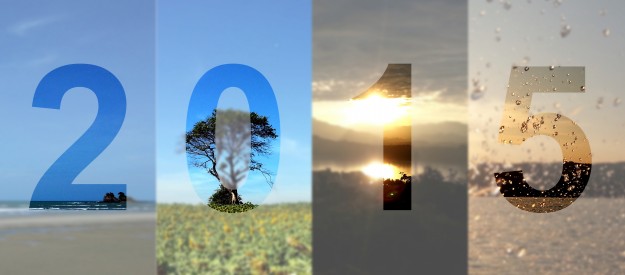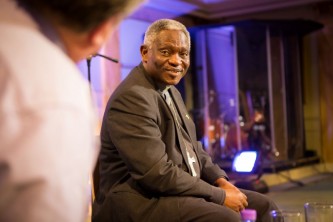"We are losing our attitude of wonder, of contemplation, of listening to creation and thus we no longer manage to interpret within it what Benedict XVI calls 'the rhythm of the love-story between God and man.'"
+ Pope Francis
The Top 10 Catholic Eco Stories of 2015

We knew that 2015 would be big. But no one guessed this big.
And so we look back with some amazement at the Top 10 Catholic eco stories of 2015. Some will be obvious (which is why we're starting this year with number 1). Some less so. Some are more themes than stories. And some you may disagree with—if so, I’d like to hear your thoughts.
While you’re at it, add your predictions for 2016. I’ll be offering hints here and posting more details in the coming days.
But now, without further ado ...
1. Laudato Si’
The big bombshell came in June, when Pope Francis contributed his definitive encyclical on all things ecology—human and otherwise. Profoundly celebrated (although belittled by some), the long-awaited “climate change encyclical” was not what some hoped for or what others feared. With some of the most beautiful language in the history of papal encyclicals, Laudato Si’ challenges us all by forever elevating and integrating environmental protection and all life issues within the one, holy, catholic, and apostolic church. Benefiting from massive preparation and follow up in Rome and around the world, Laudato Si’ is only beginning its infusion into the life of the Church. Chances are quite high that this document will hold first place again in next year’s Top Ten.
2. The Francis Effect
Would Laudato Si’ have had the same effect if issued by Benedict XVI? The Pope Emeritus’s encyclical Caritas in Veritate says a lot of what we find in Laudato Si’, especially its treatment of ecology and modern economic realities. But the rock-star reception of Laudato Si’ continues in large part because of the rock star residing on the Throne of St. Peter. Pope Francis is not merely a warm, masterful communicator who is much beloved by the secular media (more on that below), he has had the foresight to unleash an army of ecclesial generals and foot soldiers to put Laudato Si’ into action. (More on that below, too.) It’s not yet three years in to the dynamic reign of Pope Francis and already many see the work of the Holy Spirit kindling the relevance and effectiveness of the Church in this crucial stage of world history.
3. Peter Cardinal Turkson and The Pontifical Council for Justice and Peace

Peter Cardinal Turkson of Ghana, president of the Pontifical Council for Justice and Peace, has developed an impressive pastoral resume since his ordination to the priesthood in July of 1975. In this past year he tirelessly offered his intellect and pastoral zeal for the preparation and forward motion of Laudato Si’. A most important contribution made by the cardinal this year was his seminal preview of Laudato Si’ last March in Ireland. He also made repeated pastoral visits to speak with Catholics and interfaith groups in the United States—a nation embroiled in eco-political skirmishes, especially over climate change. Supported by a team of dedicated Vatican staffers—including the thorough and good-natured Fr. Michael Czerny, SJ—Cardinal Turkson and the Pontifical Council for Justice and Peace led the early drafting of Laudato Si’ and helped coordinate its messaging throughout the Church. Simply put, few Vatican offices worked as hard in 2015 as the PCJP—and by all accounts that pace won’t be lessening in 2016.
4. The Global South
Pope Francis and Cardinal Turkson aren’t the only influential ecclesial voices from the Southern Hemisphere. Joining them are Luis Cardinal Tagle of Manila, Cláudio Cardinal Hummes OFM of Brazil—both of whom are close friends of the pontiff—and a great many bishops, clerics, religious, and lay leaders from Africa, South America, and the eco-powerhouse of the Philippines. In important ways, these voices speak common languages of the pontiff—linguistically and culturally. All have ministered to people—especially the indigenous—that have been harmed by interests of Northern nations and corporations. And like Pope Francis, they’ve had enough. So have their flocks. While their voices have been rising within the Church these past decades, our sisters and brothers in the Global South have in 2015 achieved unprecedented influence in Rome and within many Church organs. This influence has been earned. More so than many Catholics in the North, Catholics of the Global South have demonstrated profound leadership and hard work in defending and implementing the eco-teachings of the Church.
5. Catholic organizational coordination at COP21
2015 saw an extraordinary number of lay and religious Catholics participating (many for the first time) in climate and eco-activism—and especially in prayer—all with the purpose of bringing the voice of faith to the COP21 international climate talks earlier this month. Making this possible were accelerated efforts by Catholic development and educational agencies such as Caritas Internationalis, CIDSE, the United Kingdom’s CAFOD, and the United States' CRS. Joining these groups were eco-ministries associated with national bishops groups—such as Catholic Earthcare Australia, the Catholic Climate Covenant here in the USA, and, most especially, the Ecology Ministry in the Archdiocese of Manila. 2015 also saw the formation and quick growth of the Global Catholic Climate Movement, a group I had the privilege to help found. Dedicated to the issue of climate change, in about ten months the GCCM signed up over 800,000 Catholic signatures for its climate petition aiming to influence COP21. It also took on hefty projects preparing for and during the Paris talks, as well as coordinating fasts and prayer around the globe. But the big story is not what these groups achieved individually. Rather it's how they coordinated and shared resources and information—and coordinated with Rome, especially the Pontifical Academy for Justice and Peace. In doing so they archived their aim: bringing the moral demands of faith to the political world of climate negotiations. All of this, of course, benefited from the Church’s global structure of dioceses and parishes (and the grace of God) which allows a global coordination that is the envy of a great many non-Catholic eco-activists.
6. The Philippines
The people of the Republic of the Philippines, mentioned twice already, get their own entry to the 2015 Top 10. From the zeal of Cardinal Tagle to archdiocesan staff (especially Lou Arsenio, the head of Manilla’s ecology ministry) to the army of bishops, parish priests, religious, and ranks of the laity (such as Yeb Saño, who led an amazing climate pilgrimage to Paris), Catholics in the Philippines understand the eco issues of our age. And they are acting. Having been hit by a string of deadly typhoons these past few years, they appreciate the need to address the causes of climate change. And they get that international and national business interest have for too long been devouring the natural resources found in the republic’s over 7,000 islands. As a result, Catholic Filipinos became in 2015 some of the most active, prayerful, and effective eco-worries in the world.
7. The secular press
A big round of applause, please, for the secular media. Whether they knew it or not, they spent much of 2015 advancing the causes of the Church—even when they were critical of it, which wasn’t as often as it once was. With Pope Francis at the helm, secular journalists were more intrigued and, yes, often gushing. Sure, they’d often overlook important theological nuances. They’d also often maintained a political hermeneutic—one of rupture rather than continuity. And they often reported that this or that statement by Pope Francis was the first time a pontiff had uttered such a proposition when in fact he was just teaching Church doctrine or repeating what his predecessors had said. But many secular journalists worked hard to get it right. And they often did. During 2015 the secular press has given the Catholic Church trillions of dollars in free publicity and this has especially pushed forward not just the Church’s eco-messaging, but the Gospel itself.
8. Right-Left political drama
With its epicenter in the United States, but found in most other Western powerhouses, crazed political operatives on the Right and the Left continue to push their larger agendas—often ignoring science and Church teachings as they do so. So-called “climate deniers” continue to spout fury and threaten schism over the Church’s growing engagement of climate change (and the associated criticism by Pope Francis and many within the Church, including past popes, of any abusive implementation of Capitalist economic systems). On the other end of the spectrum, efforts of left-wing activists are often less about integral ecology (you know, issues like abortion and marriage) and more about advancing Leftist economic and political ideologies—which, by the way, are being criticized by Rome and within Laudato Si’ as surely as market economies are when efficiency and profit rank above people. While voices like Cardinal Turkson have sought to calm fears of the political Right—noting the unique ability for market-based economies to do their part for building the common good—much more of this dialogue will be needed in 2016 to improve relations and keep our ancient enemy from alienating us any further.
9. Catholic business leaders who get it
Few spotlights have shone this year on Catholic business leaders who understand and support social responsibility and ecological protection—while also making a profit and supporting jobs. Here’s an example: A friend and local business leader here in Rhode Island has not only made his family’s national moving business a leader in doing things green, he’s teamed up with others to help businesses be both green and part of the renewable tidal wave that will fuel new profit paradigms for the coming decades. My friend Peter Arpin is also a faithful Catholic who powers his eco-enthusiasm not just with business acumen but also with the words of Christ, Pope Francis, and his predecessors. Business leaders like Peter have done much quietly for the common good in 2015. My hope is that they will make the intersection of business and Catholic ecology an even bigger story in 2016.
10. The momentum
This isn’t last because it’s least important—but it is a good place to close for now. 2015’s momentum is a reality because of everything covered so far. In ways unimagined one year ago, ecological concerns—integrated appropriately, of course—are now so deeply woven in the life of the Church that, with God’s grace, this full-forward momentum will continue in unpredictable ways the work of saving the world, as well as saving the souls that God’s creation nurtures in the here and now.
Photo of Cardinal Turkson: Flicker/CAFOD


















